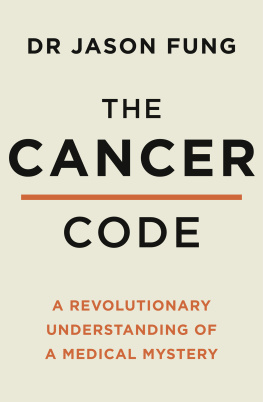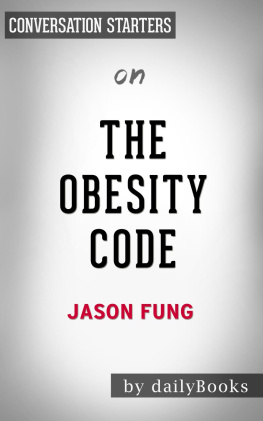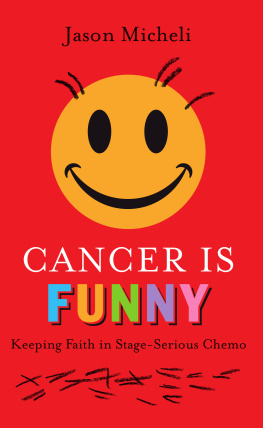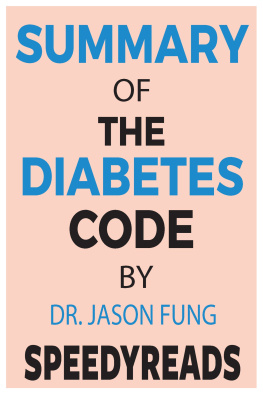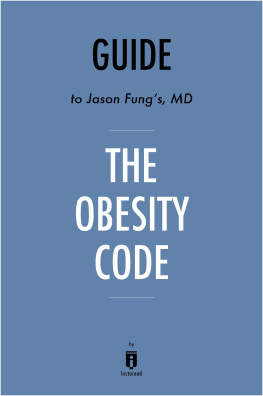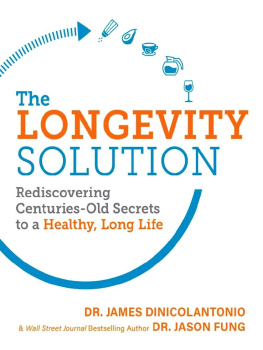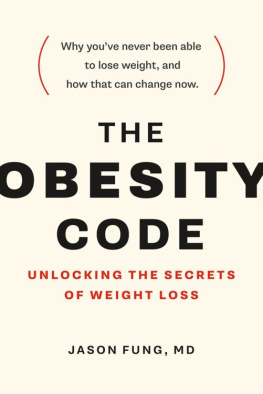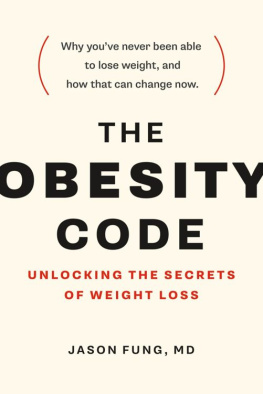Dr. Jason Fung - The Cancer Code
Here you can read online Dr. Jason Fung - The Cancer Code full text of the book (entire story) in english for free. Download pdf and epub, get meaning, cover and reviews about this ebook. year: 2020, publisher: Harper Wave, genre: Romance novel. Description of the work, (preface) as well as reviews are available. Best literature library LitArk.com created for fans of good reading and offers a wide selection of genres:
Romance novel
Science fiction
Adventure
Detective
Science
History
Home and family
Prose
Art
Politics
Computer
Non-fiction
Religion
Business
Children
Humor
Choose a favorite category and find really read worthwhile books. Enjoy immersion in the world of imagination, feel the emotions of the characters or learn something new for yourself, make an fascinating discovery.
- Book:The Cancer Code
- Author:
- Publisher:Harper Wave
- Genre:
- Year:2020
- Rating:3 / 5
- Favourites:Add to favourites
- Your mark:
- 60
- 1
- 2
- 3
- 4
- 5
The Cancer Code: summary, description and annotation
We offer to read an annotation, description, summary or preface (depends on what the author of the book "The Cancer Code" wrote himself). If you haven't found the necessary information about the book — write in the comments, we will try to find it.
The Cancer Code — read online for free the complete book (whole text) full work
Below is the text of the book, divided by pages. System saving the place of the last page read, allows you to conveniently read the book "The Cancer Code" online for free, without having to search again every time where you left off. Put a bookmark, and you can go to the page where you finished reading at any time.
Font size:
Interval:
Bookmark:
Dedicated to my beautiful wife, Mina, and my sons, Jonathan and Matthew, for all their love, support, and patience. I could not have done it without you.
I ONCE ATTENDED a hospital meeting where the director of a new program presented its past years accomplishments. Over a million dollars had been raised from the community for this new program, and hopes were high. I wasnt among those in the room impressed with the results being touted, but I kept quietbecause it wasnt really my business and because my mother taught me that if you dont have anything nice to say, you shouldnt say anything at all. Yet that didnt stop me from thinking that this program had wasted precious time and resources.
All around me, other participants were expressing their support. Great job! Congratulations! Excellent work! Even though it was obvious to everyone that there was little of value to show for the last year, most of the medical professionals around me played along with the sentiment that everything was great, just great. Nobody, myself included, stood up and yelled, The emperor has no clothes!
This problem is not unique to my hospital, but is pervasive in all of public health; it is how any bureaucracy functions. While keeping critical opinions to yourself is generally useful in personal relationships, its not useful when it comes to the advancement of science. In order to solve problems, we need to know that they exist. Only then can we understand how current solutions fall short and improve on them. Lives depend on it, after all. But in medical research, opinions that dissent from the specified narrative are not welcome. This problem cuts across entire disciplines, such as the study of obesity, type 2 diabetes, and yes, cancer.
We are witnessing the greatest epidemic of obesity in the history of the world. Look at any statistic about global obesity and youll find the news is bleak. In 1985, not a single American state had a prevalence of obesity above 10 percent. In 2016, the Centers for Disease Control and Prevention (CDC) reported that no state had a prevalence of obesity under 20 percent, and only three states had rates below 25 percent. Yikes! We cant simply blame bad genetics, because this change has taken place within the last thirty-one years: a single generation. Clearly, we need interventions, sustainable solutions to help people lose pounds and then maintain a healthy weight.
For decades, weve fooled ourselves into believing we have a prescription for obesity: counting calories. The CDC suggests that To lose weight, you must use up more calories than you take in. Since one pound of body fat contains approximately 3,500 calories, you need to reduce your caloric intake by 5001000 calories per day to lose about 12 pounds per week. This is fairly standard advice that you can find repeated the world over by doctors and dieticians, and reported in magazines, textbooks, and newspapers. Its the same dietary advice I learned in medical school. Any physician who suggests that there is a way to lose weight by any other means is largely considered a quack. But the medical communitys obsessive focus on calories has not translated into any success against the obesity epidemic. If we cannot acknowledge that our solutions fall far, far short, we will be powerless to fight the rising tide of obesity.
Few can admit that the advice to eat less, move more doesnt work. Yet the crucial first step toward solving the obesity epidemic is to admit to our shortcomings. Advice to count calories is neither useful nor effective. Instead, as Ive argued, we must acknowledge that obesity is a hormonal imbalance rather than a caloric one. Lets embrace the truth and move forward so that we can develop interventions that actually work. Only then do we stand a chance of turning the tide on this public health crisis. As the brilliant economist John Maynard Keynes is quoted as having said, The difficulty lies not so much in developing new ideas as in escaping from old ones.
The horrifying epidemic of type 2 diabetes closely mirrors that of obesity. According to the CDC, about one in ten Americans suffers from type 2 diabetes. Worse, this number has risen steadily over the past few decades, with no salvation in sight (see ).

Figure 1.1
Medications that lower blood glucose, like insulin, are the standard treatment for type 2 diabetes. Over time, patients usually require higher and higher doses of these medications. If youre taking more insulin, then its pretty obvious that your type 2 diabetes has become more severe. Yet we in the medical community (researchers, doctors) simply maintain the position that type 2 diabetes is a chronic and progressive disease, and thats just the way things are.
None of this is true. When a patient loses weight, their type 2 diabetes almost always improves. We dont need to prescribe more medication to diabetics; we need to fix their diets. But we have been unwilling to admit that our treatment approach is flawed. That would mean deviating from the agreed-upon narrative that our researchers and doctors are making brave progress against a terrible disease. Admit a problem? No way. The result? A continuing epidemic. Again, as with obesity, if we cannot acknowledge that the prevailing treatment protocol falls far, far short of acceptable, then we will continue to be powerless to help those suffering.
This brings us, finally, to cancer. Certainly, we must be making great progress against cancer, right? Almost every day, we hear reports of some cancer breakthrough or medical miracle discovered by our pioneering scientists. Unfortunately, a sober look at the available data indicates that progress in cancer research has lagged behind that of almost every other field of medicine.
In the early twentieth century, cancer didnt attract much attention. The biggest threats to public health were infectious diseases like pneumonia, gastrointestinal infections, and tuberculosis. But public sanitation improved, and in 1928, British researcher Alexander Fleming made the world-changing discovery of penicillin. Americans life expectancy began to climb, and the focus shifted to chronic diseases such as heart disease and cancer.
In the 1940s, the American Society for the Control of Cancer (the ASCC, which would later become the American Cancer Society) stressed the importance of early detection and aggressive treatment. The ASCC championed the routine use of the Pap smear, a gynecological screening test for cervical cancer. The results were a stunning success: with much earlier detection, death rates from cervical cancer dropped dramatically. This was an auspicious start, but death rates from other types of cancer continued to increase.
Deciding that enough was enough, then president of the United States Richard Nixon declared war on cancer in his 1971 State of the Union address, proposing an intensive campaign to find a cure for cancer. He signed the National Cancer Act into law and injected nearly $1.6 billion into cancer research. Optimism was running high. America had ushered in the atomic age with the Manhattan Project. The country had just put a man on the moon with the Apollo program. Cancer? Surely that could be conquered, too. Some scientists enthusiastically predicted that cancer would be cured in time to celebrate Americas bicentennial in 1976.
The bicentennial came and went, but the cure for cancer was nowhere closer to becoming a reality. By 1981, the tenth anniversary of the war on cancer, the
Font size:
Interval:
Bookmark:
Similar books «The Cancer Code»
Look at similar books to The Cancer Code. We have selected literature similar in name and meaning in the hope of providing readers with more options to find new, interesting, not yet read works.
Discussion, reviews of the book The Cancer Code and just readers' own opinions. Leave your comments, write what you think about the work, its meaning or the main characters. Specify what exactly you liked and what you didn't like, and why you think so.


